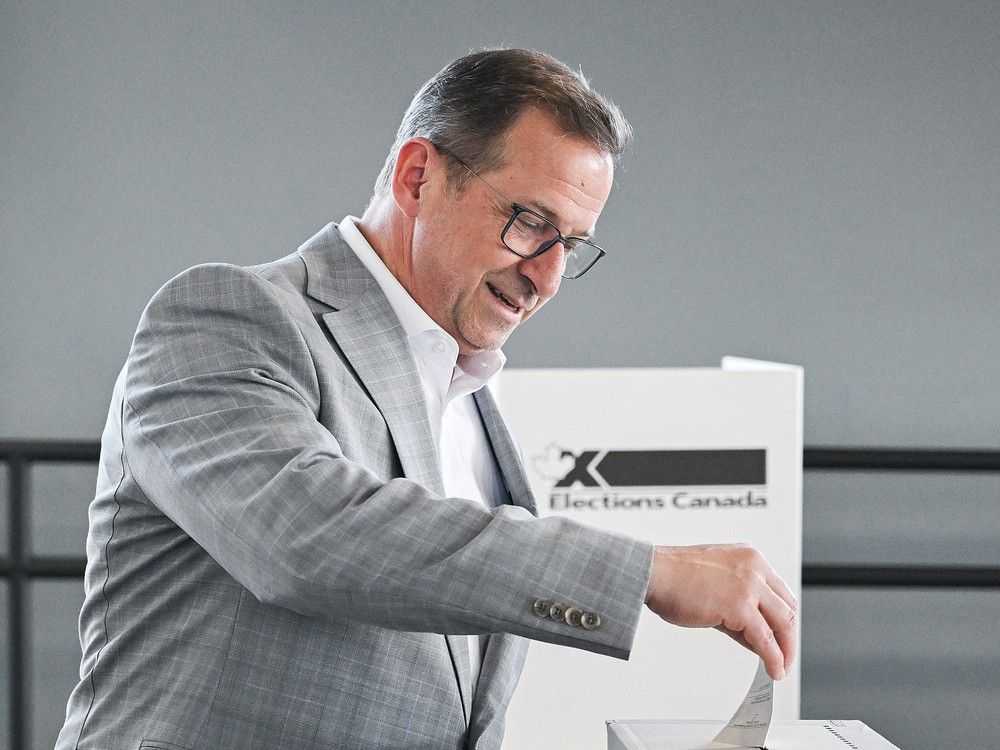
MONTREAL — The Bloc Québécois could well find itself with the balance of power of a “foreign parliament,” while the Liberal party leads a minority government with significant representation in Quebec.
Even if the Bloc loses ten seats in the province, it could now have more power than ever before with a Liberal government that may need the support of the separatist party to govern. The Liberals won or led in 164 ridings, the Conservatives 147, the Bloc 23, the NDP 8 and the Greens 1.
The governing party needs 172 seats to form a majority.
“In a complex and eventful evening, the weight of the Bloc Québécois delegation will be extraordinarily important in the composition of the next Parliament,” said Bloc Leader Yves-François Blanchet in a speech where he acknowledged his smaller team in Ottawa.
Blanchet said last week he felt he was a member of a “foreign parliament” and that Quebecers “are, whether we like it or not, part of an artificial country with very little meaning, called Canada.”
His remarks have set off a swarm of reactions from English-speaking politicians outside Quebec, including Nova Scotia Premier Tim Houston.
The outcome of the federal election is uncertain, with results in many ridings that are too close to call. The NDP and the Green Party may also be able to provide sufficient support to the Liberal government.
The Bloc has never found itself in a position where they were the unique party to keep the governing party on its feet. In 1993, the party formed the official opposition in a majority government. From 2006 to 2011, the Bloc and the NDP dominated, with the Conservatives in power.
This time, the party finds itself in a strange situation, having lost many seats to the Liberals.
The big red machine is back in Quebec. After suffering a setback just a few months ago following a surprise byelection in Montreal, where the Bloc won a miraculous victory, Mark Carney’s Liberals have won a majority of seats in the province.
The Liberals needed a strong showing in the province if they wanted to be re-elected for a fourth term, and that’s exactly what they did, adding more than 10 seats to the 32 they held at dissolution. This is the Liberals’ fourth consecutive victory in Quebec.
The Bloc held 33 seats at dissolution, having flipped the LaSalle—Émard—Verdun seat in a historic byelection in September.
On Monday, Liberal candidate and former IBM executive Claude Guay recaptured the riding formerly held by former Attorney General David Lametti and Prime Minister Paul Martin. The Bloc suffered a setback, losing ten seats, for a total of 23. The Conservative Party had high hopes for the province when it led the polls.
Before the Liberals’ historic surge in the polls, the Conservatives were aiming for nearly 20 seats in this province.
They won 10, securing their safest seats in the Quebec City region and replicating the results of the 2021 election. Alexandre Boulerice of the NDP was re-elected for a fifth term in the Montreal riding of Rosemont–La Petite-Patrie and remains the only orange representative in the province.
Despite their lead, the Liberals’ victory was marked by numerous close races in French-speaking ridings outside Montreal.
More to come…
National Post
atrepanier@postmedia.com
Get more deep-dive National Post political coverage and analysis in your inbox with the Political Hack newsletter, where Ottawa bureau chief Stuart Thomson and political analyst Tasha Kheiriddin get at what’s really going on behind the scenes on Parliament Hill every Wednesday and Friday, exclusively for subscribers. Sign up here.